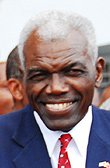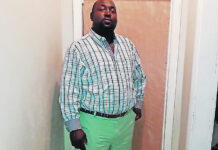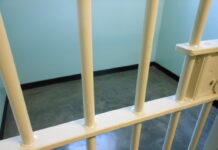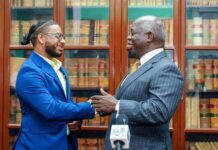The sports community mourns the passing of a great sport icon
Nassau, Bahamas — Bahamas Press records the passing of a great sports iconic figure 0 Thomas A. Robinson. BP learnt the great Bahamian slipped quietly away last evening. In tribute to him we publish these words from the greatest Bahamian writer of our time who paid tribute to him by in 2009.

With the death of Tommy Robinson, the Bahamas has lost more than just a sports icon, but one of its finest sons and a gentleman of the highest order. Following a luncheon held in his honour back in July of 2009, I wrote the following OSWALD BROWN WRITES column that was published in both The Freeport News and The Nassau Guardian on Friday, July 31, 2009.
Tommy deserves a Knighthood
By OSWALD T. BROWN
I started my journalistic career as a sports reporter with The Tribune in May of 1960. This was around the time when Andre Rodgers, the first Bahamian to play professional base- ball, was making a name for himself as a smooth-fielding shortstop for the San Francisco Giants, having been called up to the Majors in 1957, the year the Giants moved from New York to San Francisco.
I am a baseball fanatic, so it was very exciting for me to follow the exploits of my “home boy” as he made all sports fans in The Bahamas proud for having successfully transferred the skills he developed as a cricket player in The Bahamas to the sport of baseball and to become a Major Leaguer only 10 years after Jackie Robinson integrated the sport.
This was also around the time that Thomas Augustus “Tommy” Robinson was generating a wellspring of national pride throughout the country as a result of his stellar performances as a track and field star.
Tommy first served notice on the sporting world that he was a rising track star when he became the first Bahamian to participate in track and field in the Olympic Games in Melbourne, Australia, finishing fourth in the first round of both the 100 metres and 200 metres. Then in 1958, at the youthful age of 20, Tommy won the gold medal in the 200-yard dash at the British Empire Games in Cardiff, Wales, as well as a silver medal in the 100-yard dash.
By 1962, when I first got the opportunity to see him run in a major international competition, Tommy had already established himself as one of the elite track stars of his era. This was the year that Jamaica became an independent country on August 6, and I was sent to Jamaica by The Tribune along with Pierre Dupuch to cover the independence celebrations, having “graduated” from only covering sports to general assignments, which included the House of Assembly on a regular basis.
Jamaica had just christened its new national stadium, which was built to host the Central American and Caribbean Games, held from August 15-28, and while Pierre returned to Nassau after the independence celebrations, I stayed on to cover the games.
Tommy provided me with one of the proudest moments of my life when he defeated such world-class sprinters as Cuba’s Enrique Figuerola, Jamaica’s Dennis Johnson and Venezuela’s Arquimedes Herrera to capture the gold in the 100 metres. I was so overcome with joy that I forgot that I was covering the games and bolted from the press area on to the track to congratulate Tommy.
Over the ensuing years, I followed his illustrious career, not so much as a sports reporter, but as a Bahamian who was extremely proud of his remarkable success as one of the world’s top sprinters.
This past Sunday, The Friends of Thomas Augustus Robinson, an ad hoc committee formed for this specific purpose, provided an opportunity for some 800 guests to celebrate Tommy’s brilliant career as a track and field star and the conduct of his life as a downright good and decent human being when they hosted an appreciation luncheon for him in the ballroom of the Wyndham Nassau Beach Resort and Crystal Palace.
Prime Minister Hubert Ingraham had officially proclaimed Friday, July 24, as Tommy Robinson Day, and one of the highlights of luncheon was the announcement by the Prime Minister that the national stadium currently under construction and scheduled to be completed in 2011 will be named in honour of Tommy.
This unquestionably is a tremendous honour, but there is an overriding consensus that Thomas Augustus Robin-son should have long ago received a Knighthood for his contributions to this country, and a number of persons at Sunday’s luncheon expressed the opinion that when the stadium is named in his honour it should be called the Sir Thomas Robinson Stadium.
There is a school of thought that Tommy’s achievements have been overlooked in this regard for two main reasons, both of which to some extent are related to politics. Knighthoods are bestowed on individuals by Her Majesty the Queen on the advice of the Government of the day. To be sure, if it were done on merit, Tommy would have been Knighted many years ago; most certainly, before the vast majority of those who have received this honour over the past two decades.
But because The Bahamas is such a politically divided country, it would be unthinkable for the party in power to recommend someone to be Knighted who is not a supporter of that party. Tommy ran for the Culmersville Constituency as a candidate for the Free National Movement in the 1972 general election, and even though he was an excellent candidate – a national hero, tall, handsome, educated, articulate and a good role model for the youth of the country – he was defeated by Arlington Butler.
The truth is that he was fighting a losing battle from the moment he decided to offer himself as a candidate for the FNM, given the fact that it was the first general election after the major split in the Progressive Liberal Party that resulted in the defection of the group that became known at The Dissident Eight. It was this group, led by the late Sir Cecil Wallace Whitfield, which formed an alliance with “moderate” members of the predominantly white United Bahamian Party (UBP) to form the FNM.
Coming just five years after the PLP had won the historic January 10, 1967, general election – establishing majority rule in The Bahamas for the first time – an FNM winning a seat in a predominantly black constituency was more difficult than threading a needle in the dark. In the minds of an overwhelming majority of black Bahamians, who had experienced the degradation of being treated as second-class citizens in their own country under UBP rule, joining forces with remnants of that defeated party was the action of an Uncle Tom.
PLP Leader Lynden Pindling had already proven that he was a master politician by forcing the Dissident Eight – most of whom had contributed as much to the progressive struggle as he did – to make a move that would eventually lead to their suspension from the PLP; therefore, with the race card as the nucleus for PLP’s campaign strategy, Tommy had virtually no chance of being elected in 1972.
He again made a bid for the House in the 1977 General Elections, this time running for the Salem Constituency, but nothing much had changed with regard to race relations in the country, which the PLP exacerbated by again running a virulent racist campaign. This time his chances of winning were also lessened by the fact that he ran as a candidate for the Bahamian Democratic Party, a breakaway group from the FNM.
Because of his obvious opposition to the PLP, it was highly unlikely that the PLP would have nominated him for a Knighthood; however, it is certainly mind-boggling that the FNM did not do so during its first two terms in power, from 1992 to 2002.
Quite deservedly so, Sir Durward Knowles, who won an Olympic Gold medal for The Bahamas in the 1964 Tokyo Games in sailing, was Knighted in 1996, and this surely should have triggered in the minds of the powers that be that there was another national sports hero who was more than deserving of receiving a Knighthood. In fact, not one but two. Given the fact that he was the first Bahamian to play professional baseball and had 10 successful years as a Major Leaguer certainly qualified Andre Rodgers to receive such an honour.
This brings me to the other reason why Tommy and also Andre were overlooked for a Knighthood. Those who are responsible for making these recommendations to Her Majesty the Queen have been conditioned to believe that politicians are by nature preeminent candidates for the Knighthood. The list of those who have received this honour over the past two decades will provide ample evidence of the existence of this warped mindset.
So despite all the good things that were said about Tommy at his luncheon on Sunday, and despite the magnanimous announcement by the Prime Minister that the new national stadium will be named in his honour, nothing short of Thomas Augustus Robinson receiving a Knight-hood the very next time the Government of The Bahamas has the opportunity to make that recommendation would satisfy me. It is an honour that this national hero should have received a long time ago.
–30–








